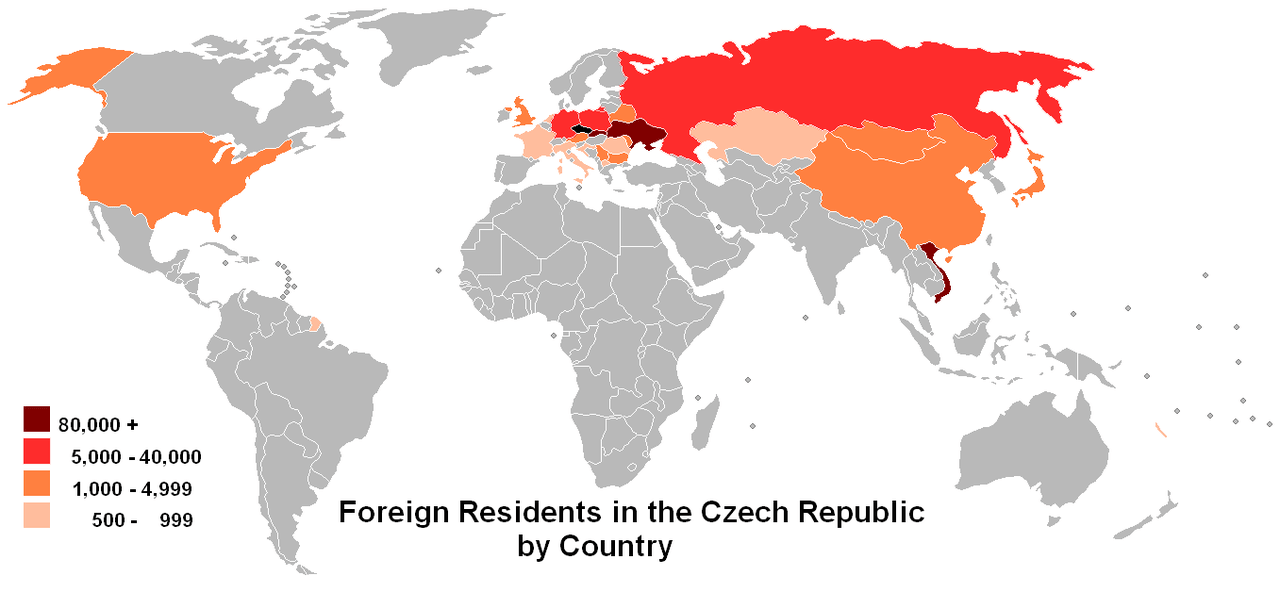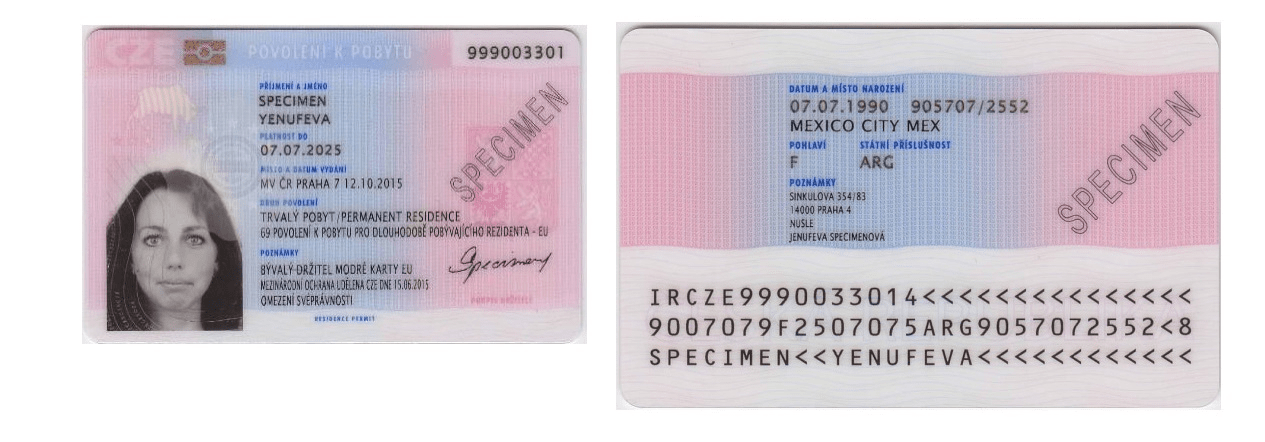Immigration to Czechia
Introducing Czechia, colloquially known as the Czech Republic, a country that can be described as an average sized European country can be described as a middle-sized European country having a rich cultural heritage with influence from many countries that have surrounded it and have occupied this area historically. Statistics show that the population of the Czech Republic is currently estimated at around 10,6 million people. The biggest ethnic group is Czech (63%). The official language is Czech, however, there are 14 minority languages, which are officially recognized.
Czech nominal GDP per capita is estimated at around 24 938 USD. The Official currency is the Czech Koruna (CZK). The Czech Republic is a proud member state of the European Union and the Schengen area, which provides many benefits to its residents.
Immigration legislation states that if you are a non-citizen of the European Union and you intend to stay in the Czech Republic for more than 90 days consecutively or if you want to conduct business activities or work, then you must apply for a long-term visa or a residence permit.
Immigration services
Immigration services in the Czech Republic are not as well developed as in many other European countries, and also compare poorly with other Eastern European states, such as Latvia. However, the Ministry of the Interior (http://www.mvcr.cz), which is responsible for issues related to immigration, does offer residence permits for qualifying company formation. Still, it may be quite difficult to obtain a residence permit in the Czech Republic. However, it is still possible to acquire a long term visa if you want to live, work or study there.
Immigration service providers
When dealing with immigration authorities while already on the territory of the Czech Republic it is essential to have the support of a Czech speaking individual or a translator, since the 'Foreign Police', assigned locally by the Ministry of the interior, rarely speak any language except Czech – you might be 'lucky' but you should not rely on finding an official that will understand you.
Here are three email address of companies which offer immigration services in the Czech Republic:
- E-mail: residency@baltic-legal.com
- E-mail: europe@forsetico.com
- E-mail: office@rutlandjezek.com
Lawful immigration
In order for immigration to be lawful, an immigrant needs to adhere to all the requirements set out in Czech law. The main law, which regulates the immigration of non-citizens of the EU in the Czech Republic, is the Law on Residence of Aliens in the Czech Republic. There are several possible options, depending on the purpose of your visit. You may need a work permit, visa or Schengen visa in order to visit the country. If you plan to reside there for a long period of time – you need to acquire a residence permit or a long term visa.
Immigration law
The main immigration law for immigrants from non-EU states in the Czech Republic is the Law on Residence of Aliens in the Czech Republic.
- Law on Residence of Aliens in the Czech Republic - http://www.czechlegislation.com
- Ministry of the Interior (Department for Asylum and Migration Policy - http://www.mvcr.cz
- Ministry of Foreign Affairs (Entry & Residence Department) - https://www.mzv.cz/jnp/en
The first article of the Law on Residence of Aliens in the Czech Republic defines such a foreigner as follows: (2) The foreigner shall mean the natural person who is not a citizen of the Czech Republic, 1a), including a European Union citizen.
Immigration statistics
The statistics of immigration in the Czech Republic are quite controversial among Czech citizens. According to the 2011 census, there are almost 543 000 permanent legal immigrants living in the Czech Republic, which is 5% of the total population. Immigrants from Ukraine form the largest ethnic group, which is estimated for around 118 000 permanent residents.

Biggest cities by population
The most popular city for immigrants is Prague. It is also the biggest city in the Czech Republic. The other two big cities by population are Brno and Ostrava. However, Prague is more than two times bigger than Brno and Ostrava combined.
Tourists mostly visit Prague with its fine Hapsburg dynasty Austro-Hungarian architecture, bridges and museums. Brno is also quite famous, mostly for its cathedral and Zoo, as well as being home to local offices of many international technology companies and sitting in the scenic hilly wine-growing region of South Moravia.
| # | City | Population |
|---|---|---|
| 1 | Prague | 1 313 508 |
| 2 | Brno | 377 440 |
| 3 | Ostrava | 294 200 |
| 4 | Plzen | 169 033 |
| 5 | Liberec | 102 562 |
| 6 | Olomouc | 100 378 |
Services for Immigrants - Embassies in the Czech Republic
Below is a list of foreign embassies in the Czech Republic:
- Embassy of the Republic of Argentina
- Embassy of the Republic of Azerbaijan
- Embassy of the Federative Republic of Brazil
- Embassy of the Republic of Canada
- Embassy of the People's Republic of China
- Embassy of the Arab Republic of Egypt
- Embassy of the Republic of Finland
- Embassy of the France Republic
- Embassy of the Federal Republic of Germany
- Embassy of the Hellenic Republic (Greece)
- Embassy of the Republic of Indonesia
- Embassy of the Grand Duchy of Luxembourg
- Embassy of the Kingdom of the Netherlands
- Embassy of the Russian Federation
- Embassy of the Suadi Arabia
- Embassy of South Korea
- Embassy of the Kingdom of Spain
- Embassy of the Swiss Confederation
- Embassy of the Kingdom of Thailand
- Embassy of the Republic of Turkey
- Embassy of Ukraine
- Embassy of the United Arab Emirates
- Embassy of the United States of America
- Embassy of the Socialist Republic of Vietnam
Migration in and out of Schengen area
The Czech Republic is a member state of the Schengen area. Countries of the Schengen Agreement have abolished passport and immigration control at their internal common borders and for travel between their member states. Member countries also recognize Schengen visas issued by other Schengen states. On the outer border, or upon first entry to the Schengen area, normal immigration control procedures apply, however admission to any Schengen country is considered admission to the whole Schengen area (all member countries), with no further immigration checks needed.
Third-country nationals holding long term visas may stay in the Czech Republic for more than 90 days. Due to the strict immigration policies, sometimes it may be quite hard to acquire a Schengen visa directly from the Czech Republic. A list of documents and grounds for requesting a visa can be found on the web site of the Ministry of the Interior.
Types of visas in the Czech Republic
If staying in the Czech Republic for a short time period under 90 days, a third-country national must apply for one of several types of visas in order to make his/her visit legal. According to the Immigration policy legislation of the Czech Republic, there are several different types of visas, which must be acquired depending on case and circumstances:
| Type C visa | Stay up to 90 days | Travel health insurance, documents on sufficient funds and proof of accommodation required. |
| Type A visa | Airport visa | Airplane ticket required |
| Type D visa | A study, employment, long-term stay | Travel health insurance, documents on sufficient funds, proof of accommodation, police clearance certificate, a document proving the purpose of stay are required. |
Residence permit
Currently, with the exception of the qualifying business formation already mentioned, there are only three ways to obtain a residence permit in the Czech Republic for non-EU citizens: family reunification, study and scientific research.
As you can see, there are very few grounds for submitting an application for a residence permit in the Czech Republic. If you want to know more about residence permits in the Czech Republic, you can read guidance from the Ministry of the Interior here: http://www.mzv.cz/.

Immigration documents
To read more about the various immigration, residency and citizenship documents in Czech Republic, please refer to the immigration documents section.
History
One of the most noticeable moments in the history of immigration in the Czech Republic occurred during the Soviet period, during which time the governments of Vietnam and Czechoslovakia had a deal concerning the education of Vietnamese people in Czechoslovakia. Vietnamese people started immigrating to Czechoslovakia in the year 1956 and then the number of new immigrants grew until the fall of communism. Currently, the population of the Czech Republic includes, it is estimated, around 83 000 Vietnamese immigrants – who are most immediately noticeable by the many non-stop food establishments that they own and run.
In case you have questions or you need a free consultation regarding immigration opportunities to the Czech Republic, feel free to contact us: